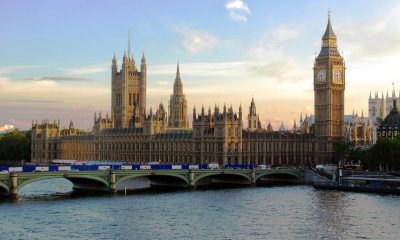News
Zinke: Border wall ‘complex,’ faces geographic challenges

Geographic and physical challenges – including the Rio Grande and threatened wildlife – will make it difficult to build the “big, beautiful wall” that President Donald Trump has promised on the U.S.-Mexico border, Interior Secretary Ryan Zinke said Wednesday. (Photo: Jonathan McIntosh/ Flickr)
WASHINGTON –Geographic and physical challenges – including the Rio Grande and threatened wildlife – will make it difficult to build the “big, beautiful wall” that President Donald Trump has promised on the U.S.-Mexico border, Interior Secretary Ryan Zinke said Wednesday.
Building a wall “is complex in some areas,” including Big Bend National Park and along the river, which twists through nearly half of the 2,000-mile border, Zinke said.
Hundreds of species live within 30 miles of the border, including threatened jaguars and Mexican grey wolves. The Trump administration is poised to relax protections for the jaguars, which live in northern Mexico and parts of the southwestern United States, to make it easier to build the wall.
Throughout the campaign, Trump energized his crowds with his insistence that a wall will be constructed along the border and that Mexico will pay for it. Zinke’s comments, and the administration’s budget proposal seeking billions in U.S. taxpayer dollars to finance the project, offer a reality check and a possible sign the president is moving away from his initial plan.
The complications Zinke highlighted were the same faced by Trump’s predecessors, George W. Bush and Barack Obama, as they sought to build or complete hundreds of miles of fencing along the border.
Fencing that is already in place is a mixture of various designs, including towering steel bollards designed to keep both people and vehicles from moving north and shorter steel posts aimed only at blocking cars. In parts of Texas’ Rio Grande Valley, some stretches of fencing are nearly a mile away from the border in part to accommodate flood plains and an international treaty.
And in Texas, almost all of the land along the border is privately owned. When Bush tried to build border fencing starting in 2006, he faced stiff opposition from local ranchers and farmers, many of whom took the government to court on plans to use their land.
The Department of Homeland Security is responsible for the border wall, but Zinke said the Interior Department will play a critical support role. According to the Government Accountability Office, federal and tribal lands make up about 632 miles (1,017 kilometres), or roughly 1/3 of the nearly 2,000-mile (3,218-kilometres) border.
“At the end of the day, what’s important is American security and to make sure we have a border,” Zinke told reporters on a conference call. “Without a border a nation cannot exist.”
An internal report prepared for Homeland Security Secretary John Kelly estimated that a wall along the entire border would cost about $21 billion. Congressional Republicans have estimated a more moderate price tag of $12 billion to $15 billion.
Customs and Border Protection said in a statement Wednesday that cost estimates are “premature as there are many variables that are currently unknown.” The agency said it could not provide a detailed estimate for the project.
Kelly told Congress in January that a wall wouldn’t be a complete fix for the border.
“A physical barrier in and of itself will not do the job,” Kelly said during his confirmation hearing. “Certainly it has to be a layered approach.”
Zinke’s comments appeared to bolster that view and followed remarks he made Tuesday to the Public Lands Council, a group that represents Western ranchers.
“The border is complicated, as far as building a physical wall,” Zinke said in remarks first reported by E&E News. “The Rio Grande, what side of the river are you going to put the wall? We’re not going to put it on our side and cede the river to Mexico. And we’re probably not going to put it in the middle of the river.”
Electronic monitors may be more appropriate in that region, Zinke said, while areas with imposing natural features may not require additional reinforcements.
The border is already dotted with underground sensors and camera towers, along with about 700 miles of fencing in Texas, New Mexico, Arizona and California, and it’s unclear how much new fencing the Trump administration is proposing.
According to new budget details sent to Congress, the administration wants immediate funding to complete an existing barrier in the Rio Grande Valley, $500 million to complete 28 miles of a border levee wall near McAllen, Texas, and $350 million for construction along two segments near San Diego.
Senate Democrats have threatened to filibuster any provision providing money for the wall. Many Republicans aren’t very enthusiastic about the plan and say the White House has given them few specifics.
Republican Sen. Roy Blunt of Missouri, a key budget negotiator, said the Senate is unlikely to include money for a border wall in a broader spending package to avert a partial government shutdown next month.
Customs and Border Protection, the Homeland Security agency that will eventually patrol and maintain any new fencing or walls, has asked contractors to submit proposals for a 30-foot-high wall that is difficult to climb or cut through. Bids were originally due to the government by Wednesday, but the deadline was extended to April 4 amid questions from possible bidders.
In a pair of contract notices made public two weeks ago, the government said proposals could lay out plans for a solid concrete wall or a structure that can be seen through by border agents.





















